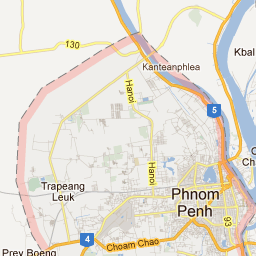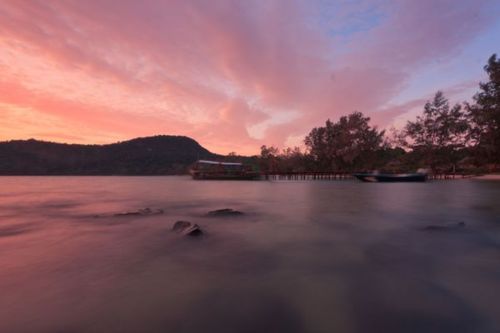This was long enough ago that I don’t remember if it was raining when we landed in Phnom Penh, or if it was just really humid.
The Mekong River rolled by the National Highway, and it was near dusk. the copper light of the water almost matched the dirty match smell of the air, and the hazy gray yellow of — it wasn’t smog — it was wood smoke. The fields were burning somewhere.

Our cab driver, Sam, turned around to talk to us. It was April. I think it was Easter holiday. He wore a mop of black hair and a gap toothed smile, tinged with something red, like the pann that Indians spit on the street in Mumbai.
He pointed to where three men had died four years earlier in a grenade attack, this being the nature of Cambodian politics. He pointed to the large cathedral of a hotel on the banks of the Mekong. He said he would do his best to be the best tour guide for us on our visit.
Gambling was illegal for most of Cambodia, but not for the Russians, the oligarchs of Asia and the Camobdian parliament. It thrived in that golden palace. We drove by, and he spoke, in concerned tones, about the way the country was being led. Not an uncommon refrain for anyone in any small southeast Asian country. But it was our first trip off the luxury circuit. It hit us like a rock. We tried to feel just as grave, not knowing if we were supposed to be feeling this concerned, or if it was just our guilt for being white and holding a blue and gold American passport.

This photo by Robert Armstrong captures the beauty that we found ourselves in.
We arrived at our hotel. As we pulled in, we saw a tent and about fifty Cambodians sitting underneath on blue tarpaulin, beating drums.
It was the beginning of the rainy season, and the beginning of a holiday period. Young men and young women dressed up in colorful costumes carrying long poles strung wth wild flourescent flags.
But these Cambodians were protesting, said Sam. They worked for the hotel and they were aware, he said, of how much it really costs to buy a case of Coke. They served Coke all day to foreigners and wealthy Cambodians who bought single servings of Coke for nearly one-third the cost of a case. Why then, were they being paid so much less, relative to all the Cokes they sold, asked Sam.
It was a question Sam had an answer to, but that he only expressed with the rubbing together of his thumb and two fingers. Money, my friend. Money.
We checked in and rode the elevator to the fifth floor. I tipped the hotel staff. I entered into our hotel room and looked out the back window at the Mekong and the young men and women standing underneath the window with their flourescent flags flying in the snapping wind.
I went back down to sit in with the protesters, and I took some pictures, all of which are gone. I lost them when a hard drive they were stored on got wiped.
Night came.
I walked into the lobby of the hotel with my SLR. I noticed a man talking to another man. The man doing the talking was very tall, and he was wearing a suit that was too hot for this humid April night. He leaned over the table and he emphasized a point. He happened to look up at me as I snapped his photo.
He saw me and stood up immediately speaking what seemed to be Russian. He walked after me and I got into the elevator.
“Who are you,” he asked, almost breathlessly, as the lift doors closed behind him. He stood in front of me, almost four inches taller than me. He seemed to block the whole front of the elevator with his body.
“I am just a tourist, taking pictures,” I said.
“Let me see that camera,” he asked, grabbing for it.
I refused, and he kept asking why I was taking pictures.
“I’m just a tourist, I like taking pictures. Are you upset about the pictures?” I asked.
“Erase that!” he demanded.
The doors to the elevator opened and I showed him my screen. There was no photo there. I had erased the photo while he was talking to me. I had no desire to cause any trouble, but I also didn’t really care who he was. I thought very strongly that he was with the Russian mob. He could have also been an intelligence officer.
He let me pass into the hallway.
“No more pictures!” he yelled and then stood in the elevator doorway as the doors closed and I walked with my friend down the hallway, looking back to make sure he was gone.
We left for Siem Reap the next day. On the way to the airport, Sam stopped by a food stall and picked up some food.
Small chicken wings for breakfast for my friend and I. A bag of fried Cockroaches for him, my treat.

Douglas Crets is an intelligence officer and expert network builder for the social web. Using his training in journalism, digital media, anthropology and the humanities, he creates social media research projects for and about the leading social web entrepreneurs of today. His company, dB C Media provides companies and individuals with data, behavioral research studies, branding advice, consulting on social media execution and meaningful media content to create efficient interactions with consumers, and influencers and on the web, so that brands, companies and individuals can form relationships that matter. His traveling takes him to at least 12 countries a year. He speaks Russian and understands Chinese.








